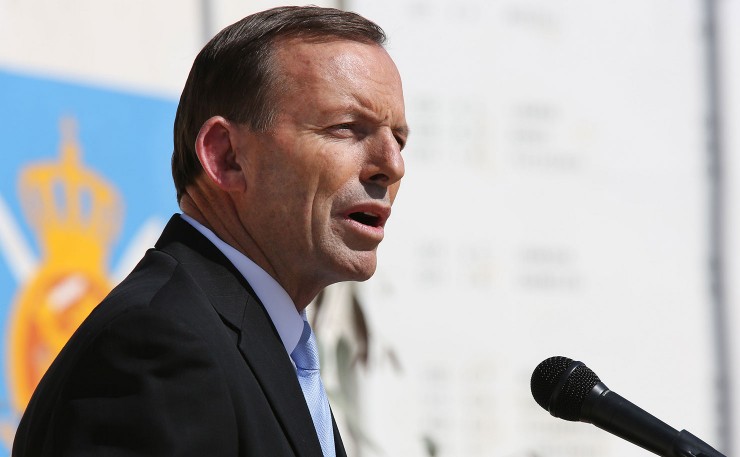When Malcolm Turnbull announced he was going to challenge Tony Abbott’s leadership of Australia, he said that he was going to bring in a new style of leadership.
“We need advocacy, not slogans,” he declared. “We need to respect the intelligence of the Australian people.”
Whilst Abbott was best known for his election slogans about boats and tax, he also pushed the new war on Iraq with little more than innuendo and cheap sloganeering. This is also how he pushed the new war on Syria.
If Turnbull is serious about respecting the intelligence of Australians, why doesn’t he start by seriously debating the war on Syria? An easy place to start is in the Senate, which is a place one would think is expected to discuss those sorts of issues.
Let’s review. On September 9, Abbott announced the expansion of the war to include bombing Syria. He observed, “As we all know, Daesh does not respect borders and its onslaught in Iraq is supported from bases in Syria. We cannot defeat Daesh in Iraq without defeating Daesh in Syria too.”
The Daily Telegraph reported an “intelligence source said the Prime Minister had told defence chiefs that if and when the decision was made, he wanted at least one air strike by the end of this week.” It took about two hours for Bill Shorten, so-called Leader of the Opposition, to endorse the new war.
The Guardian reported that there was some concern about the new war from ALP MPs Melissa Parke, Doug Cameron, Alannah MacTiernan, Jill Hall, Andrew Giles, Pat Conroy, and Sue Lines. Their concerns weren’t expressed in any public statement, and there has been basically no debate in either the Parliament or the Senate on the new war.
Turnbull derided the Abbott government for relying on slogans instead of advocacy. One would think that war is above all an issue that requires cool and calm reflection, and serious analysis. The decision to go to war should never be taken lightly, and a government which is concerned about the loss of life war brings would welcome critical scrutiny to the greatest extent possible, to ensure that our policies are wise, humane, and don’t needlessly risk human lives.
So what happened in our Parliaments?
House of Representatives on September 9
In the lower house on September 9, Bill Shorten suggested that they discuss a “matter of public importance”: “The humanitarian crisis in Syria”.
A series of tedious speeches followed by the ALP and Coalition, defending the new war, mostly advancing the same slogans and making similar fatuous claims. The ALP used more elevated rhetoric about the nobility of Australia and our war effort. Apparently, Syrians have been clamouring for Australia to help them by joining the group of countries bombing them. Shorten claimed, “At the heart of our response to the crisis in Syria is the recognition that the world Australia belongs to, the world of prosperous, peaceful and stable democracies, has failed the people of Syria.”
Shorten defended the supposed legality of the war by claiming it was in defence of the Iraqi government: “This is not the second Gulf War, and we are not in Iraq seeking regime change; nor does the extension of RAAF air missions seek regime change in Syria. Our actions have always been at the request of the Iraqi government. They and our allies and international partners have requested that we extend our operations to Syrian airspace to deal with cross border attacks.”
Shorten also included a supposed limitation on the war: “ADF operations in Syria must be constrained by the proposed legal basis of the collective self-defence of Iraq. We have called on the government to confirm that any Australian use of force will be of a level necessary to halt and prevent the cross border attacks on Iraq or to defend Australian personnel. Our use of force must always be proportionate to those threats and subject to international law.”
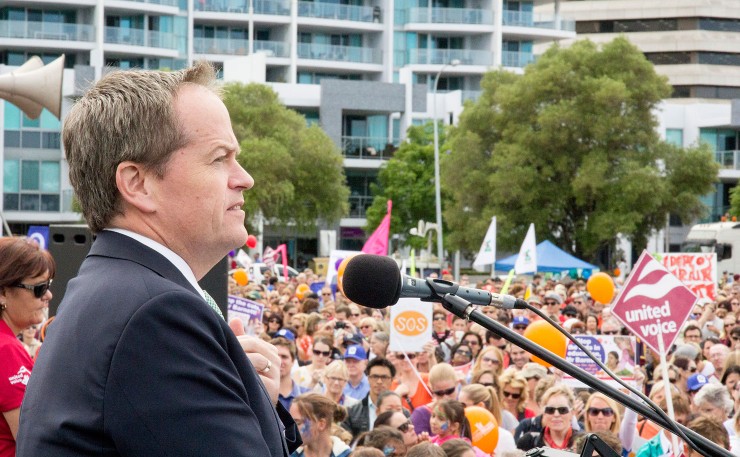
Given that he has already endorsed the war, this is presumably a figleaf to malcontents within the party, rather than a serious reservation.
He continued: “We cannot hope to drain the swamp of terrorism by military means alone”, before dubiously claiming “that ISIL would target Australia regardless of what we did.”
Finally, Shorten explained the unique morality of the ALP’s principles: “to work for the betterment of humanity, not just at home but wherever we can lend a helping hand.”
Shorten also claimed that the “Australian government should use all available diplomatic and political means to support a cooperative international multilateral solution to this current crisis.”
Considering that we have just escalated the war by adding another belligerent to it, it is hard to take seriously his professed concern about diplomacy. Foreign Affairs Minister Julie Bishop similarly claimed, “We will continue to advocate a political solution that can bring an end to the conflict in Syria, for we must deal with the case of this humanitarian crisis and not just the consequences.”
This is simply sloganeering. What kind of political solution does Bishop want? The defeat of Assad? The defeat of the Islamist rebels? A compromise? Nothing of the sort has been suggested, beyond our desire for defeating our enemy.
This simply makes resolution of the conflict more difficult, as the war is being taken further out of the hands of the Syrians themselves, and increasingly driven by the interests of foreign powers which have shown little concern for the Syrians who are actually paying the price of the war.
Last week, there was an important report that Russia offered a peace deal in February 2012 which would include Assad stepping aside. The message was passed on to the American, British and French missions at the United Nations, which promptly ignored the offer.
The result has been the complete devastation of the country. It was already clear by August 2012 that the West’s favoured rebels were fanatical jihadis. Indeed, US intelligence predicted the emergence of a “Salafist principality in Eastern Syria”. If there is any evidence that more Western meddling will make the situation less catastrophic, it has not yet been produced.
Tanya Plibersek, the ALP apparatchik, naturally supported the bombing too. Last year, she explained that “Labor does not support taking action in Syria similar to that being taken in Iraq. There is no clear evidence that such Australian involvement could successfully provide relief to the humanitarian crisis that is occurring in Syria. It’s not clear which of the forces on the ground we could support. And there is no clear international support or authority for that kind of action.”
By August 15, this had been toned done to “many serious questions that remain unanswered”. On 21 August, we did need a “strong military response” to Daesh, and by 28 August we had a “humanitarian obligation” to help them.
Does anyone seriously think people in Syria have been anxiously waiting for Australia to bomb their country?
As expected, on September 9 Plibersek endorsed the new war.
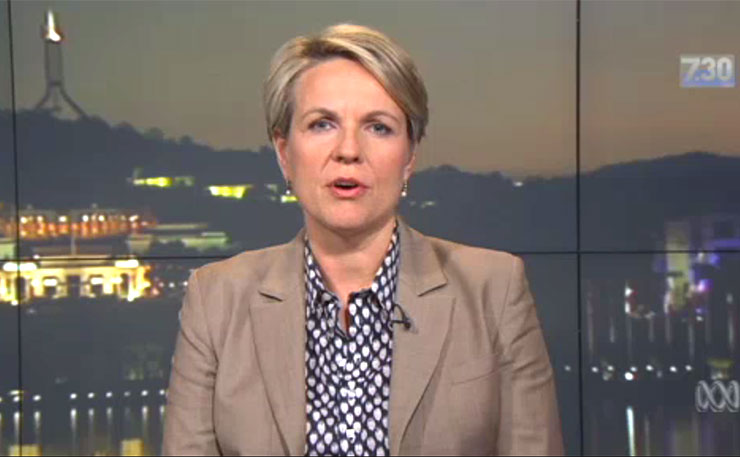
Plibersek said we must provide “safe havens” for Syrian refugees, apparently without opening our doors wider to Syrian refugees, or treating more humanely Syrian refugees in immigration detention.
Presumably she simply means we should create more safe areas in Syria through bombs.
Plibersek too favours a “political solution”, which quite literally everyone in every conflict is in favour of. The question is what kind of political solution? Plibersek, like the others in the parliamentary debate, didn’t go beyond cheap slogans.
The Senate debate on September 9
Whilst in the lower house, the “debate” was just exchanges about how glorious our new mission is, in the Senate, the Greens had already signalled their opposition to the war. Fearing that the new policy would be subjected to critical scrutiny, the two major parties did their best to block such debate.
Greens leader Senator Richard Di Natale tried to merely discuss why they couldn’t debate the war on Syria. He observed that other countries like the UK and Canada debated their involvement in the war on Syria, so “Why is it that our Prime Minister will not allow the same debate in the Australian parliament before committing our troops to another war?”
Liberal Senator Eric Abetz began by ridiculing the idea that this was a serious issue. He thought Di Natale was “getting somewhat overexcited when he suggests that extending air strikes into Syria is starting or creating another war. This is the same evil that we are fighting, and have been fighting, which has a base in Syria.”
It’s no big deal, why should anyone get “overexcited” over Australia bombing Syria?
Senator Abetz then adopted the path of his then leader, with cheap slogans about how Daesh has done lots of terrible things, and “Yet there is not a word of support for our service men and women, or the service men and women of other countries that are doing exactly the same. We on this side salute the service of our men and women who are putting themselves on the line to protect us” and so on.
Di Natale claimed that there was a genocide going on in Syria, but that Daesh wasn’t the primary source of it. This appears to be Di Natale’s favoured argument against the war – that Assad is even worse than Daesh. In an interview with Andrew Bolt, he said that Assad, not Daesh, is the “main game” in Syria.
The debate then moved to Senator Abetz’s continued sleazy baiting of the Greens, by claiming that they don’t support “our service men and women”, unlike “We on this side”.
Greens Senator Peter Whish-Wilson responded, noting that “To suggest that because we question an executive government strategy on the deployment of our armed forces, our service people, that we therefore do not support our defence people is the worst kind of dog whistle politics.”
Senator Di Natale moved that “a motion relating to Australian forces in Syria may be moved immediately and have precedence over all other business this day until determined.” He objected to the “most serious accusation [from Abetz]that could be levelled at a member of the Australian parliament. It is an accusation stating that somebody who questions our involvement in a conflict is somehow questioning the commitment that we have to our service men and women.”
Di Natale responded that this was “the refuge of a scoundrel. To suggest that what we are doing by questioning our involvement in a war in Syria is somehow reflecting a lack of commitment to the troops engaged in conflict in that region is pathetic”.
Liberal Senator Ian McDonald then raised a point of order. McDonald has earned attention recently for suggesting in the Senate that Doug Cameron should “speak Australian”. He also admitted to not having read the Gillian Triggs report on children in detention that he so harshly condemned.
McDonald also distinguished himself by referring to GetUp as the Hitler Youth wing of the Greens.
Senator McDonald expressed mystification on Di Natale’s motion. He explained, “My point of order is that he is not explaining why it is essential to suspend standing orders.” Why couldn’t it be dealt with “in some other way”?
Senator Di Natale responded obviously enough: “I do not know what could be more important than the lives of Australian service men and women. What could be more important than that? Why are we not having a debate in this parliament about whether we should be committing our troops to another conflict overseas”?
He also commented, “When the Prime Minister says he wants at least one air strike by the end of the week — and, coincidently, we have a by-election the following week — you start to ask questions about what is motivating this conflict.”
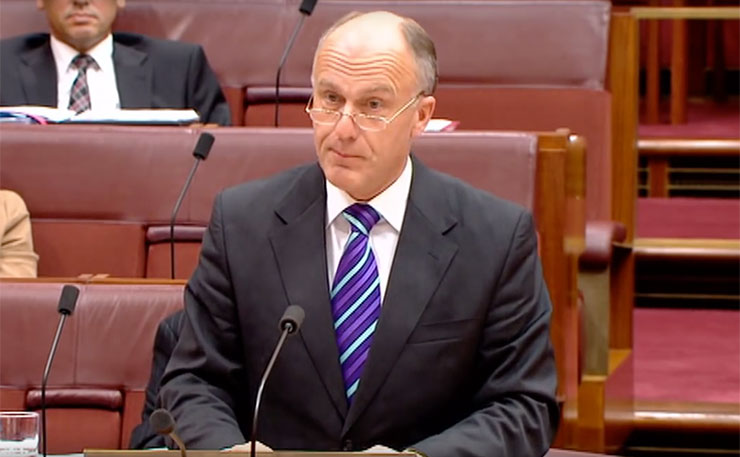
Senator Abetz responded with the reasoned argument for which the Liberals under Abbott became famous. He said:
The government opposes the motion; no case has been put in relation to urgency. The last thing our service men and women need is the strategic thinking and input of the Australian Greens as to how we might conduct military activities overseas.
I think what they actually want is the advice of the intelligence services and the men and women who are at the apex of the Defence organisation.
The Leader of the Australian Greens, as is their wont, hypocritically asserted that I engage in the activity of ‘the refuge of the scoundrel’ and he accused the Australian Prime Minister of sending young Australian service men and women into a theatre for only one purpose — that is, his own political benefit.
That is a disgraceful suggestion. It is beneath contempt. And yet, while they say it is outrageous to say anything against their motives, they drop it by the bucket load on the Prime Minister and say that is all fair.
It is hard to overstate the sheer cynicism of this attack on the Greens. Yet this represented most of the actual debate on the war we have seen thus far in the Senate – and indeed, in either house on the war on Syria.
Senator Stephen Conroy of the ALP then responded, in appropriately servile fashion:
“The Opposition will not be supporting this motion. We do accept the general view that has been put that there should be a parliamentary discussion on this. In fact, we made this point very strongly to the government today.
What we would prefer is, as was promised by then Minister Johnston in this chamber, regular updates. It has been a while since we have had an update, and I call on the government to provide to the chamber an update.”
So no actual debate on the war is needed, but it would be nice if the federal government told Senators how the war was going.
Why actually subject the war to any critical scrutiny? Why let the Greens argue about it? Conroy even added, “I urge the government to clear some time in the parliamentary schedule, by negotiation or from its own time, to enable all of the senators in this chamber to discuss and debate this issue”.
He made that claim whilst voting against the Senate actually debating the war. Because the ALP thinks we’re stupid too.
Liberal Senator Mitchell Fifield then decided to mock Di Natale, claiming “his effort consisted of waving his arms and saying, ‘Blah, blah, blah.’”
Of course, “the government is not suggesting for a moment that decisions of the government of the day should not be debated — of course they should; that is part of the purpose of the parliament — but there are appropriate forms and procedures for that to happen.”
And it would be inappropriate to debate the war on Syria the day Abbott decided that Australia would bomb Syria. The Greens should plainly just be content with debating the war when the Coalition feels like discussing it, whenever that might be.
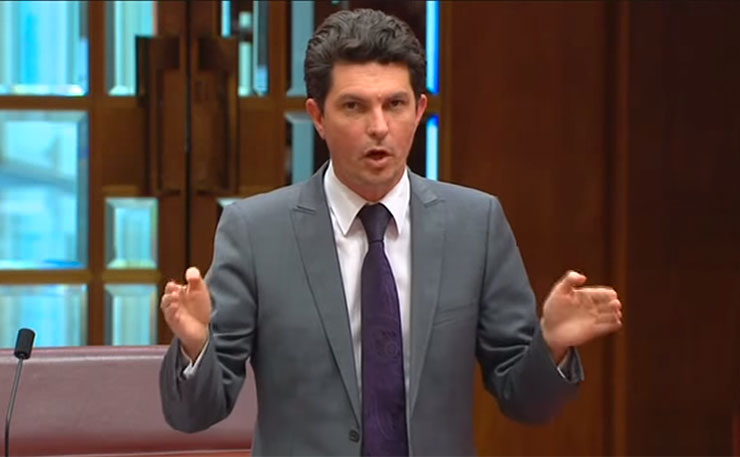
Senator Scott Ludlam then gave a passionate speech about the war on Syria, which was very much to his credit. He said:
“I understand that the suspension of standing orders is not a trivial matter, and it is not something that the Greens would engage in lightly. But I was still flabbergasted to hear government spokespeople deny that there was a sense of urgency around a debate such as this. It is an urgent matter when the Prime Minister unilaterally commits the ADF to a conflict on the other side of the world where the strategic imperatives are completely unclear, the success conditions are unclear and the legality is unclear.”
Then came the vote on whether the Senate would debate the war. 37 noes, 10 ayes. The ayes were the Greens and Senator Jacqui Lambie.
The continuing non-debate
The Greens have continued to try to debate the war in the Senate, to little avail. You can watch this video of Senator Ludlam, from September 17, frantically objecting to the war in the one minute and seven seconds he was given to speak.
“I rise with a sense of dismay that the parliament has left precisely four minutes for this discussion to occur… It is an insult to the service personnel that we send overseas that the parliament would set aside four minutes for a debate of this nature.”
He complained that:
“The document tabled by the outgoing Minister for Defence that the Senate has been given four minutes to reflect upon tells us a tiny little bit about the government’s military intentions, which many believe were fast tracked for entirely domestic political reasons, but nothing at all about the political or diplomatic solution in Syria. There is no military solution to the civil war inside Syria, our only contribution being to fan the military flames. It is entirely counterproductive.”
At that point he was cut off.
So, Mr Turnbull, how about it? Why not let the Senate debate the war? If you believe in “advocacy, not slogans”, why don’t you start by allowing a serious debate on the war on Syria?
Donate To New Matilda
New Matilda is a small, independent media outlet. We survive through reader contributions, and never losing a lawsuit. If you got something from this article, giving something back helps us to continue speaking truth to power. Every little bit counts.

